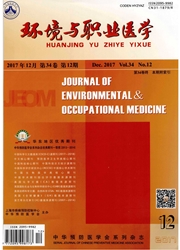

 中文摘要:
中文摘要:
近年来,代谢综合征在世界范围内的发病率正在急剧上升,已经成为了一个热点问题。动物实验和流行病学调查提示:环境内分泌干扰物暴露与代谢综合征的发生有着密切的相关性,但是二者之间的病理机制并不明确。与代谢综合征有关的环境内分泌干扰物主要包括烷基酚类、有机氯农药、多氯联苯、二噁英和重金属等。本文综述了上述几种环境内分泌干扰物暴露与代谢综合征间关联的证据及可能的作用机理的文献,结果显示双酚A能影响β细胞的形态和功能,诱导胰岛素抵抗和2型糖尿病的发生。重金属可增加氧化应激并诱导线粒体功能紊乱,这可能是重金属暴露导致高血压和糖尿病等代谢疾病的机制之一。
 英文摘要:
英文摘要:
The increasing worldwide incidence of metabolic syndrome (MS) is a public concern. Experimental and epidemiological studies indicate associations between exposure of environmental endocrine disruptors (EEDs) and MS risk. However, the underlying pathological mechanism is not clear. The EEDs associated with MS include alkyl phenols, organ chlorine pesticides, polychlorinated biphenyl, dioxin, and heavy metals. The present review summarized evidence on the association between EEDs exposure and MS as well as potential mechanism, and concluded that bisphenol A could influence the morphology and function of β cells and induce insulin resistance and type 2 diabetes. Heavy metals could increase oxidative stress and induce mitochondrial dysfunction that may increase the risks of some metabolic diseases like hypertension and diabetes.
 同期刊论文项目
同期刊论文项目
 同项目期刊论文
同项目期刊论文
 期刊信息
期刊信息
